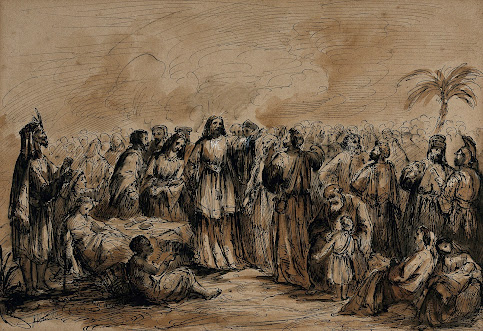The Pharisees went out and took counsel against Jesus
to put him to death.
When Jesus realized this, he withdrew from that place.
Jesus was always in control of his own life and death. When he handed himself over it would not be because the Pharisees had chosen to take him, but rather because himself knew that his hour had arrived. He might well have ignored the Pharisees and continued to provoke a greater and greater popular response until his ministry was cut short before it was meant to be. A mere human, with his ego on the line, might have done this to avoid the way withdrawing might be seen as running away, as a loss, or at least a lack of overwhelming success. But the good that could be gained and the negative press that could be avoided if he stayed were not important to Jesus. Not all positive popular acclaim was worth seeking in his eyes. Nor was all negative public judgment worth avoiding. In short, he was entirely self-determined in his actions, not at all conditions by a need to be a people pleaser or to appear a certain way in the sight of others.
Many people followed him, and he cured them all,
but he warned them not to make him known.
People that had more than a superficial interest in Jesus would continue to follow him anyway, and did so. Among them were those who hoped he would cure them. Jesus was not going to stop his healing ministry to please others. It did seem to be a way that genuine faith in him was kindled. But this was the case only when there was a direct connection between himself and those who sought healing. It didn't serve Jesus at that time in this context to have such healings be the basis for ever increasing fame. As such fame spread out in concentric circles it became more and more of a generic fascination and less and less about Jesus himself. It served only to provoke his enemies and did not do enough to bring to him those who would put genuine faith in him. Those whom it drew were seeking more of a show than a savior. Jesus desired mercy above all, and his ministry never devolved into a performance.
Behold, my servant whom I have chosen,
my beloved in whom I delight;
I shall place my Spirit upon him,
and he will proclaim justice to the Gentiles.
We saw at his baptism that Jesus was this chosen servant, the beloved Son in whom the Father was well pleased. He was the one on whom, rising from the waters of the baptism of John, the Spirit descended in the form of a dove. He was in fact the Messiah who would extend the blessings promised in the covenant to Abraham to all nations. But the way he would accomplish this cut against many of the expectations of his day. He was not going to succeed by overwhelming military force, nor even overwhelming success by any obvious measure. He was, as he himself had said, "gentle and lowly in heart" (see Matthew 11:29).
He will not contend or cry out,
nor will anyone hear his voice in the streets.
A bruised reed he will not break,
a smoldering wick he will not quench,
until he brings justice to victory.
And in his name the Gentiles will hope.
Jesus didn't have to fight in order to win, or at least not in the traditional sense. His victory was not going to come about by shouting down opponents, much less by physical violence. He knew that the only true victory was the victory of the cross, which was opposed to every form of egotism. He was all but the opposite of politicians who court favor by any means necessary. His arrest, the abuse heaped on him, and finally his death appeared to be the end of his story in the eyes of the world. They may well have asked what a Messiah could do for them from the cross? What indeed.
You do see, for you behold misery and sorrow,
taking them in your hands.
On you the unfortunate man depends;
of the fatherless you are the helper.

No comments:
Post a Comment